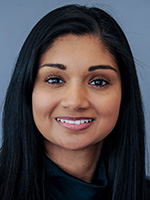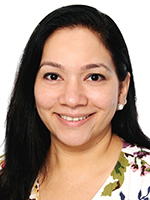Bank of America’s Serina Hourican and Deepali Pendse discuss their experiences of career progression, diversity and inclusion, and the value of mentorship.
Watch video


Serina Hourican
Head of Commercial Sales, Global Transaction Services, Asia Pacific


Deepali Pendse
Head of Corporates, Global Transaction Services, South East Asia

Deepali Pendse: Serina, you’ve moved from the UK to Singapore to be with us. Tell me a little bit about your move and how this came about.
Serina Hourican: I moved about nine months ago in the middle of the pandemic. I was delayed by about five months, which meant I had to start my APAC role from London. That was challenging, because I’ve got a team based in eight different countries across four different time zones. Doing that from London was quite difficult, especially when I had to get up so early in the morning – as you know, I’m not really a morning person! I was delighted that I could make it to Singapore in July.
DP: It’s interesting to hear about your career. In the last 25 years I have seen my career evolve as I’ve worked in different continents, countries and lines of business. In every single move, I’ve been able to grow and invest in myself. My biggest takeaway is the importance of investing in your career – whether that’s by going back to school or making calculated moves in their career – and also to make yourself a little more uncomfortable, because that’s what brings the best out of you.
So tell me, Serina, how did you make yourself uncomfortable, and who helped you get to this level?
SH: I was really supported by the bank when I moved from London to Singapore. I had to let my manager know a year in advance that I was open to new opportunities. It’s fascinating learning about different countries and cultures, so I’m pleased I can be here.
There have been a number of men and women who have helped me get here, and what really helped is that they believe in promoting diversity. In the past, people have tended to lean towards those who do things the same way as them. But diversity is about having people who think differently, and who can challenge each other and get the best out of each other.
DP: I think we’ve both been lucky enough to be supported by people who believed in us, and as senior leaders we need to bring that forward. Serina, I know you always speak very fondly about your senior women colleagues, who have made you what you are today. Would you like to share something about them?
SH: I really would. There’s one person that comes to mind: a lady who brought me into Bank of America. I used to work with her in my previous organisation and she really helped me grow my network and gave me the feedback I needed to help me grow.
One particular example was when we were looking at a promotion year, and she sat me down and said, “Look, we could put you through this year. But if you did X, Y and Z next year, I think you’d have a much better chance of getting it.” So that gave me something to work on, and I was successful in getting my promotion.
DP: That sounds like a tough conversation for your mentor to have with you, but it’s interesting to know that when she said what she would do for you, she kept her word. I think that is so important when you’re looking up to your mentor or your sponsor.
The other thing I can see is that while she has let you know certain things need to be done in a different way, she has made sure you haven’t lost what you are. In my view, that’s what inclusion is all about – letting the other person be what he or she is, and giving that person a comfortable space to speak up. What’s also important is making sure that when you’re hearing, you’re actually listening and not just waiting to respond to what the other person is saying.
SH: That really resonates with me. Sometimes my team will come to me and say they are nervous because they have to present to a client. What I say is, “Don’t worry, just be yourself.” I know some people don’t like that expression, but I think it’s really important that people can come to work and be themselves.
DP: We’ve both been lucky to have such people in our professional lives. And I think we both have a small motto that we have always lived by. So what has yours been, Serina?
SH: Mine is ‘Failing to prepare is preparing to fail’. I’m one of those people that like writing lots of notes and reading over them. For me, it really works, and I think when you’re looking at your career development, it’s about knowing what the potential next step could be, and not feeling like you missed an opportunity. What about you?
DP: Mine is that whether it’s your personal life or your professional life, it’s like the stock market – it goes up, and it goes down. To a large extent, I think it’s important to treat every success as a blessing, and every failure as an opportunity to learn and grow. By looking at life in this way, we can become better versions of ourselves.